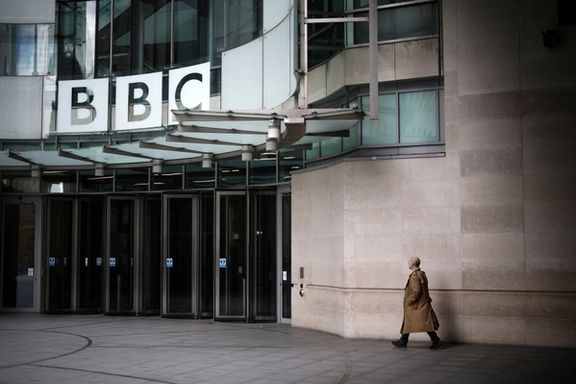BBC's Deal With Iran Over Election Coverage Angers Staffers

A reported deal between the BBC and authorities in Tehran over the coverage of Iran's controversial elections has outraged its Persian service staffers, Iran International has learned.

A reported deal between the BBC and authorities in Tehran over the coverage of Iran's controversial elections has outraged its Persian service staffers, Iran International has learned.
The BBC's decision to send its correspondent Caroline Davies to cover Iran's elections in Tehran has resulted in internal tensions at the broadcaster, as managers are believed to have acquiesced to the Iranian regime's condition that its Persian broadcast department be barred from using her reports and videos.
Staff members of the Persian service believe "by accepting this conditionality, the BBC has allowed the Iranian government to dictate the terms of BBC's reporting."
They have warned that BBC's decision "isolates" them, "divides the BBC, and signals to the Iranian government that BBC Persian is fair game for harassment and persecution," particularly of their families in Iran.
BBC has repeatedly stated in recent years that the Islamic Republic has harassed, intimidated, and threatened BBC Persian journalists and their families in Iran over the past decade, including death threats against BBC journalists and their families in London, blocking their assets in Iran, and online harassment, and sexual assaults against female journalists.
The Persian service staff members say they had made it clear to the BBC's top management a few years ago that such decisions are "unacceptable". However, "it has happened again."
Asked about the issue, a BBC spokesperson told Iran International, "The BBC is committed to providing our UK and global audiences with impartial coverage of the Iran elections and our correspondent, Caroline Davies, has been granted rare access to the country to report for BBC News across TV, radio and online."
"The BBC has not been able to report from Iran since 2019. Reporting from the country at this critical time does not reduce our condemnation for the harassment faced by BBC News Persian staff and we continue to call out the utterly unacceptable treatment for those simply doing their jobs," the spokesperson added.
BBC Persian, which broadcasts on TV, on radio and online, is banned in Iran. BBC Persian obtained in 2017 a court order that listed the names of 152 staff, former staff and contributors whose non-liquid assets were frozen by Iran's judiciary.
BBC Persian journalists had not been able to return to Iran for fear of arrest, while family members had been subjected to travel bans, interrogated and arbitrarily detained.
Iranian social media users have in recent days criticized the BBC correspondent's reports from Tehran, saying she did not cover the key issues including the widespread boycott of elections. There is also a perception that the BBC had not acted impartially in its reporting. Iranian users specifically compared Caroline Davies's reports with those of Deutsche Welle’s (DW) correspondent whose reports from Tehran covered issues like the election boycott, compulsory hijab, and the impact of the Woman, Life, Freedom movement on these elections.
Back in 2019, the Huffington Post reported that the BBC had "agreed to conditions set by the Islamic Republic of Iran to not share reporting materials it gathers in Iran with its Persian-language channel, BBC Persian, in exchange for Iran allowing a BBC correspondent into the country."
"The agreement represents a capitulation to a government that has been hostile to press freedom. The Iranian government routinely shuts down media organizations critical of the regime and imprisons, tortures and executes journalists," the Post reported at the time.